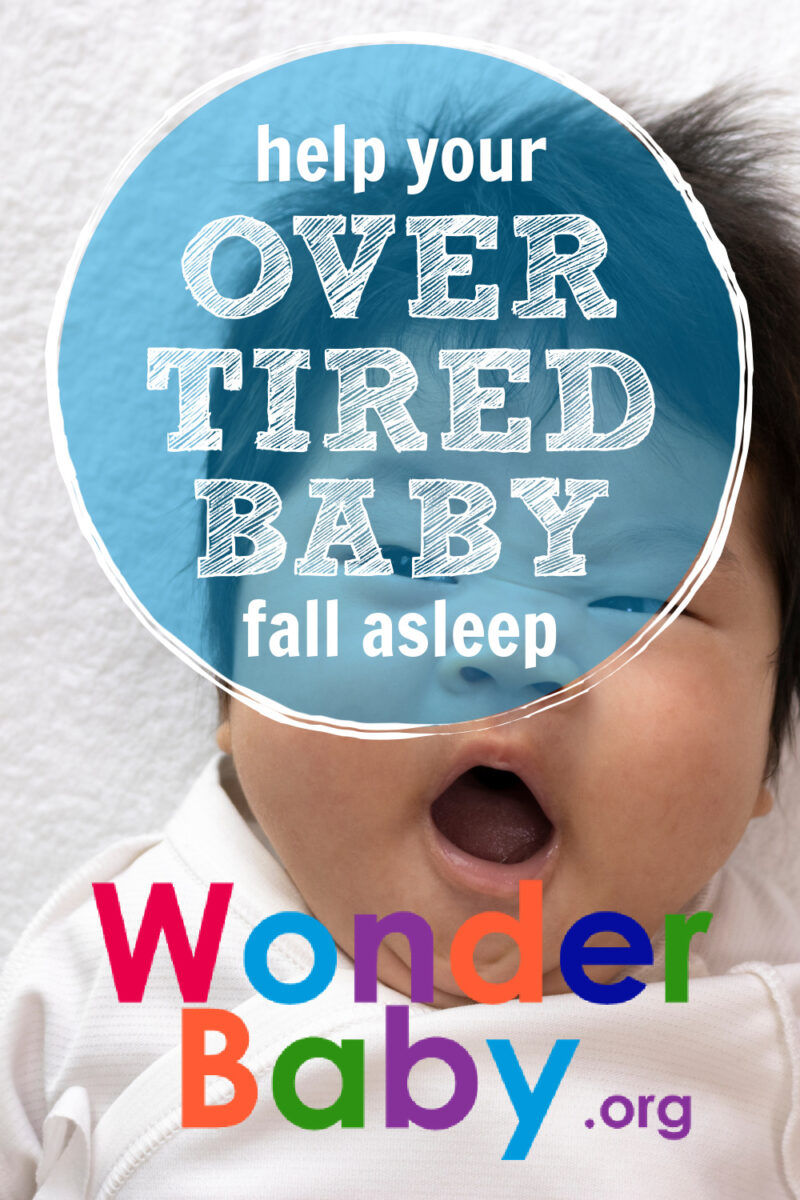How to Help Your Overtired Baby Fall Asleep

- Babies need all the sleep they can get to keep up with their rapid physical, emotional, and mental development.
- An overtired baby is an exhausted baby. Frequent overtiredness may affect your baby’s overall health.
- It becomes challenging for babies to fall asleep the moment they become overtired.
- Your baby needs a solid sleep schedule to avoid overtiredness.
- Overtiredness sets your baby’s body into overdrive and becomes a cycle that is difficult to break. It’s a miserable experience for your baby and family to endure.
Your baby looks so tranquil when she sleeps, doesn’t she? She may have drifted off to Dreamland, but her body is actually hard at work. With each rise and fall of the belly, her muscles and tissues are building and repairing themselves. Your little one’s brain is processing the constant flow of sensations and encounters from when she was awake.
Sleep is crucial to your baby’s development, but even the most well-meaning parents keep their babies awake past their limit. Skipping naps will not promote better sleep at night; it will only create poor sleep habits and an overtired baby. You can get ahead of overtiredness by learning your baby’s cues and knowing her age-specific wake windows.
When tempted to linger in conversation with your friends or make one more round at the grocery store, remember that your baby may not be so supportive. Keep your eye on the clock and on the prize: a happy, well-rested baby.
Once you’ve encountered an overtired baby, you’ll know the consequences that sleeplessness can leave in its wake. You’ll want to do everything in your power to avoid this monster—overtiredness, that is. (Certainly not your baby.)
How Do Babies Get Overtired?
When your baby stays awake for longer than she can handle, she becomes overtired. If your baby usually stays awake for 2 hours but she’s still awake after 2.5 hours, she’ll likely become overtired.
Babies experience stress and overstimulation when they’re overtired. The stress hormone cortisol floods the body, increasing heart rate and blood pressure. This rush of internal activity makes it difficult for babies to recognize that they’re tired.
This becomes a cycle. Your baby will wake up after an insufficient amount of sleep time, become overtired, and her stress response will disrupt her sleep again.
How Do You Know If Your Baby is Overtired?
Signs of an overtired baby include:
- Rubbing eyes and tugging ears. Your baby may attempt to soothe herself by bringing her hands toward her face.
- Yawning. Yawning signals the onset of drowsiness and change in her physiological state.
- Crossing of the eyes. Focusing becomes a struggle.
- Avoiding eye contact. Your baby may disengage with you and stare off into the distance.
- Clinginess. Between three and 12 months old, babies tend to become clingy when overtired.
- Fussiness. Your baby may appear irritable.
- Arching the back and squirming. She may also appear uncomfortable.
- Being demanding. Your baby is unhappy whether you pick her up or put her down.
- Clumsiness. Older babies tend to become especially clumsy and unable to focus.
- Hyperactivity. She may seem playful even though she’s exhausted.
- Taking shorter naps than usual. You can blame those hormones again for interrupting your baby’s nap time.

Why Do Overtired Babies Fight Sleep?
When your baby’s body has reached the fight-or-flight stage of tiredness, her survival instincts keep her wide awake. Your baby needs to sleep, but she fights it because her body is too charged up with energy. Sleep may come, but chances are she won’t stay asleep for long.
How Do You Get an Overtired Baby to Fall Asleep?
To no fault of her own, your baby is fighting sleep, the very thing that she needs the most. Remember it’s not you; it’s all that energy that she doesn’t know how to handle while being overtired. Take comfort in knowing that you can help her go to sleep.
Ways to get an overtired baby to sleep include:
- Swaddling your baby. When snug and warm, your baby may recall the safety and comfort of the womb. She may resist at first (because that’s what overtired babies do), but settling down can soon follow.
- Gently rocking your baby. Research studies show that the rhythmic motion of rocking babies helps block out distracting stimuli and promotes sleep.
- Singing a lullaby. Use a quiet voice and sing a simple, slow-paced melody.
- Creating a peaceful sleeping environment. Neutral wall colors and a comfortable temperature produce a calm atmosphere.
- Dimming the lights. Better yet, draw the blackout curtains.
- Turning on the white noise machine to mask disruptive household noises. Your baby may also associate white noise with sleep.
- Having a system. There are many excellent sleep training methods that can help your baby fall asleep.
How Do You Prevent an Overtired Baby?
Follow these steps to stop the cycle of overtiredness before it begins:
- Be punctual. When your baby’s wake window comes to a close, drop what you’re doing and put down your baby to sleep. The key is to prepare her for sleep before she shows signs of overtiredness.
- Create a sleep routine. A sleep routine like the one advocated in the Ferber sleep training method will signal to your baby that the time for slumber is approaching:
- Switch on soft music or the white noise machine.
- Change your baby’s diaper without playing or tickling her.
- Read a story in a calm tone.
- Gently massage his back, arms, and legs.
- Maintain a consistent sleep schedule. Keep naps and nighttime sleep at similar times You’ll know that it’s time to adjust the schedule when your content (not overtired) baby isn’t falling asleep.
- Let your baby settle down. Extra rocking and bouncing can stimulate her rather than calm her down.
- Learn your baby’s natural sleep schedule. Her sleepiness cues will become more apparent when you’re familiar with her sleep schedule. The American Academy of Pediatrics recommends these wake times according to age:
- 0–4 months: less than 45–60 minutes
- 4–6 months: 1 to 2 hours
- 6–12 months: 2 to 3 hours
- 12–18 months: 3 to 4 hours
- 18 months–2 years: 4 to 6 hours
How Do You Calm an Overtired Baby?
Your overtired baby’s wailing, screaming, and crying can be disheartening. Here are proven ways to calm and soothe your baby:
- Use a quiet voice when talking to your baby.
- Take her to a dark and quiet space.
- Maintain a calm expression but avoid eye contact. Meeting eyes may further stimulate your baby.
- If your baby resists touch, gently place her down on her back.

Should I Let My Overtired Baby Cry It Out?
Maybe your baby is already upset from being overtired, and she’s struggling to settle down. At this point, your baby needs additional assistance to help her fall asleep. Consider trying cry-it-out sleep training methods when she’s established a predictable sleep schedule and routine. Your little one is more likely to learn how to sleep independently when she’s well-rested.
FAQs
What Does an Overtired Baby’s Cry Sound Like?
An overtired cry tends to sound higher-pitched, intense, and more nasally than a normal cry. Overtired babies tend to wake from their short naps with a jolt followed by cries and screams.
Can an Overtired Baby Be Sleep Trained?
It’s not very likely that an overtired baby is functional enough to endure sleep training. Overtired babies sleep for short periods and have difficulty falling asleep. You and your baby can enjoy more progress and longer durations of sleep when she’s well-rested.
Is Being Overtired Bad for Babies?
Yes. Sleep is crucial for the development of babies. Overtiredness causes stress, which activates adrenaline and cortisol in your baby’s bloodstream. Cortisol prevents babies from obtaining REM (Rapid Eye Movement) sleep, which is restorative sleep. Overtired babies wake up before reaching this critical sleep phase. They may miss out on all of the benefits that REM supports, including:
- Emotional coping skills
- Learning and memory
- Brain development
How Long Can it Take for an Overtired Baby to Fall Asleep?
The time it takes for an overtired baby to fall asleep will vary from several minutes to even an hour. According to the National Sleep Foundation’s Sleep in America Poll, overtired babies take up to 20% longer to fall asleep.

Related Posts

Sleep, Special Needs
Safe Place Bedding Travel Bed Review
Traveling with a special needs child can be stressful! Having a safe, durable, and easy to use travel bed can make traveling so much easier!

Sleep, Special Needs
Sleep Regimen for Premature Babies: Special Considerations
It can take premature babies much longer than their full-term peers to sleep for long stretches. A preemie sleep schedule may encourage better sleep.

Sleep
Mastering the Bedtime Routine: 3 Tips for a Peaceful Night’s Sleep
From around six weeks, a newborn bedtime routine can help your baby learn the difference between day and night and prepare for a restful night’s sleep.